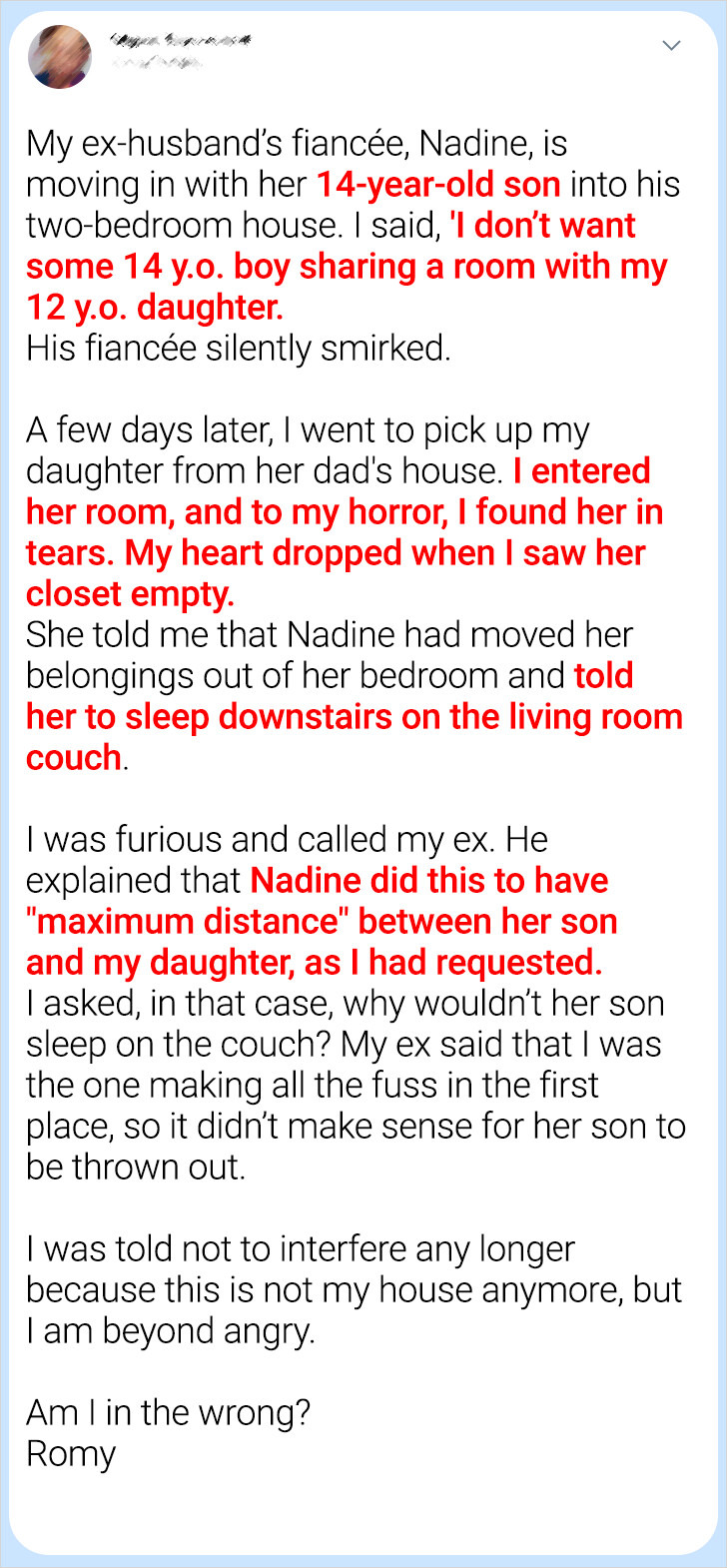So, let me get this straight the gf has kicked your daughter out of her room, and is forcing her to sleep on the couch. I suggest seeking mediation and speaking with a lawyer. Also contacting Child welfare agency. Alternatively moving your daughter into your home permanently.
I Refuse to Allow My Daughter, 12, to Share a Bedroom With Her Teenage Stepbrother

Blended families often face increased tension and drama, particularly during the initial phase of cohabitation. Romy is firmly opposed to having her young daughter share a room with her ex-husband’s fiancée’s son. Unfortunately, the small size of the house means there are no alternative arrangements. When Romy held her position, an unforeseen solution arose, only adding to her frustration. Here’s how she recounted her experience.
This is Romy’s letter:

Hi Romy! We appreciate you sharing your experience with us. We’ve come up with four tips that could be really valuable for you.
Document the details of the situation.
Maintain a thorough record of all communications and incidents concerning this issue. Document dates, times, and summaries of interactions with your ex and Nadine, and note any relevant observations regarding the living arrangements.
This documentation will be vital if you need to consult with legal professionals or involve family services to ensure that your daughter’s well-being is addressed.
Prioritize your daughter’s well-being.
Prioritize your daughter’s emotional needs and provide her with support and reassurance. Consider involving a therapist or counselor specializing in children’s issues to help her navigate this difficult transition.
Ensure she knows she has your support and create a stable and comforting environment at home to counterbalance any distress she may be experiencing from the situation at her dad’s house.
Seek legal advice if needed.
Speak with a family law attorney to explore your rights and options. They can help you determine if you have a case to contest the living arrangement or take other legal actions to protect your daughter’s best interests.
The attorney can also advise you on how to handle any potential breaches of custody agreements or parenting plans.
Consider mediation.
Schedule a meeting with your ex-husband and Nadine to address the situation. Involve a neutral mediator, such as a family counselor or a trusted mutual friend, to help guide the conversation.
Make it clear that the objective is to create a fair and respectful arrangement for both children, considering your daughter’s emotional needs and exploring alternative solutions that work for everyone.
Our other reader, Kirsten, is also dealing with the complexities of a blended family. She asked her ex-husband not to bring his wife due to their strained relationship. This request led to unexpected tensions, prompting Kirsten to seek advice from us.
Comments
Oh heck no. Her son is the newcomer; he gets the couch. I would request an emergency custody hearing so you get full custody and dad can have supervised visits. Your daughter's safety is first priority.
Related Reads
12 People Shared Creepy Stories About the Most Horrific Deeds of Their Ex

Meet The Benjamin Button Twins Who Captured People’s Hearts

10+ Wardrobe Choices You Don’t Realize Are Ruining Your Look

We Turned 16 Old Hollywood Icons Into Modern Celebrities — The Results Will Surprise You

15 Celebrities You Probably Only Remember Older — Their Younger Selves Were Absolute Stunners

I Refused to Be Called Grandma — And It Destroyed My Family

14 Historical Figures We Know Only Through Art — and What They Actually Looked Like

95% Tattooed Man REMOVES His Ink — The Transformation Is Unreal

14 Celebrity Kids Who Are All Grown Up

12 Real Stories That Prove Even Small Acts of Kindness Can Create Huge Ripples

12 Smart Travel Tricks You’ll Want to Use on Every Trip

16 Celebrities Who Embarrassed Themselves — and Proved They’re Human Too




